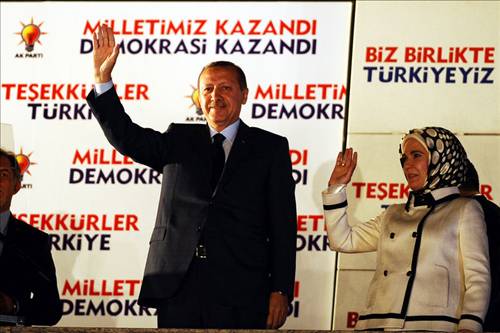Turkey's Ruling Party Wins Election
- Written by Admin TOA
- Published in Politicians
 ISTANBUL (AP) — Turkey's ruling party surged to a third term in parliamentary elections Sunday, setting the stage for the rising regional power to pursue trademark economic growth, assertive diplomacy and an overhaul of the military-era constitution.
ISTANBUL (AP) — Turkey's ruling party surged to a third term in parliamentary elections Sunday, setting the stage for the rising regional power to pursue trademark economic growth, assertive diplomacy and an overhaul of the military-era constitution.Turkish Prime Minister Recep Tayyip Erdogan addresses his supporters gathered in front of his Justice and Development Party headquarters in Ankara, Turkey, late Sunday.
However, the Justice and Development Party of Prime Minister Recep Tayyip Erdogan fell short of a two-thirds majority in parliament, a shortcoming that will force it to seek support for constitutional change from other political groups. Despite a record of democratic reform, the government has faced increasing criticism that it has sought to consolidate power at the expense of consensus-building.
Erdogan sought to allay those concerns in his victory speech, delivered from the balcony of the ruling party headquarters to thousands of ecstatic supporters who gathered below, chanting slogans and waving Turkish flags.
"We will be humble," said Erdogan, who pledged to start work on a new constitution. "We will be seeking consensus with the main opposition, the opposition, parties outside of parliament, the media, NGOs, with academics, with anyone who has something to say."
Erdogan's party won 50% of the votes, according to TRT, the state-run television. It said the Republican People's Party, the main opposition group, had 26% of the vote.
TRT said another opposition party, the Nationalist Action Party, had 13%, signaling it would stay in parliament by crossing a 10% vote threshold designed to keep out smaller parties.
According to the tally, the ruling party won 325 seats in the 550-seat parliament, a comfortable majority that ensures the continuation of its single-party rule. It had 331 seats in the outgoing parliament. Lawmakers serve four-year terms.
Turkey, a NATO ally with a mostly Muslim population, stands out in a region buffeted by popular uprisings as a power with traditional Western alliances and growing ties in the east and elsewhere. The government says it seeks to craft a Western-style democracy and join the European Union, but its Islamic roots are a source of suspicion among secular circles that once dominated Turkey with military help.
Ilter Turan, a professor of political science at Istanbul's Bilgi University, said the ruling party now had political capital to spend, though hard debate awaits. Erdogan had previously spoken about shifting Turkey to a presidential system, a source of worry for some Turks who fear he will seek the post and stay in power for many years to come.
"If Erdogan had reservations on certain policies in the past, for fear of losing votes, he is now free to implement those," Turan said. "He seems to be going toward a presidency. Such a presidential system move is sure to create controversy in the country."
The Anatolia news agency reported that police detained dozens of people in the mostly Kurdish southeast for allegedly trying to coerce people into voting for the Peace and Democracy Party, a Kurdish party accused by officials of links to Kurdish rebels.
The party fielded independent candidates to work around the 10% vote threshold for Turkey's parliament, turning in a strong showing with 36 seats. It seeks more rights and autonomy in the southeastern strongholds of the ethnic minority, which makes up about 20% of Turkey's 74 million people, and rebels have threatened attacks if the government does not negotiate.
In his victory speech, Erdogan alluded to Turkey's ambitions as a regional leader and voice for Muslims, declaring Bosnians, Lebanese, Syrians and Palestinians would benefit from the election as much as Turks. Turkey has spoken for the rights of protesters in uprisings in the Middle East and North Africa, but its ties to autocratic leaders have jeopardized its policy of "zero problems" with neighbors.
In the past decade, the government has sharply reduced the political clout of the military, and taken some steps to ease restrictions on minorities, though reforms have slowed in recent years. Erdogan has promised that a new constitution would be more democratic than the one implemented under the tutelage of the military in 1982.
Turkey's leaders describe themselves as "conservative democrats" and after winning election in 2002, they implemented economic reforms that pulled the country out of crisis. The growth rate last year was nearly 9%, the second highest among G-20 nations after China.
Still, political reforms faltered in the ruling party's second term. Turkey's EU bid has stalled, partly because of opposition in key nations such as Germany and France. Critics point to concerns about media freedom and the Turkish government's plans for Internet filters as signs of intolerance toward views that don't conform to those of Turkey's leadership.
For all of Turkey's challenges, Sunday's vote was an indicator of stability in an increasingly confident country. Most voting was peaceful and orderly, with large crowds gathering early to cast ballots. About 50 million Turks, or two-thirds of the population, were eligible to vote. NTV television said turnout was 87%.
For the first time, voters cast ballots in transparent plastic boxes in which the yellow envelopes could be seen piling up. The measure was designed to prevent any allegations of fraud. In past elections, wooden boxes were used.
Last modified onSaturday, 06 May 2017 10:07
Tagged under
Latest from Admin TOA
- World Energy Council Türkiye Holds the Opening Meeting of the Young Energy Leaders (YEL’26) Program
- The Shared Pulse by Eda Uzunkara
- NEO HUMAN 10.0: How Will the Future Be Shaped? (Filiz Dag)
- Calculatit.net Is Bringing Pricing Transparency to America’s Construction Industry
- Support Independent, Trustworthy Journalism








